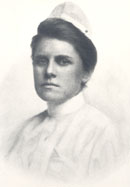In Her Words
Letter from Julia C. Stimson to her family, November 1, 1917
Rev. Henry A. Stimson, father of Base Hospital 21 chief nurse Julia C. Stimson, compiled his daughter’s letters to her family during the First World War into the book, Finding Themselves. Published in 1918 (before the end of the war), Finding Themselves tells of the experiences and gradual changes in the nurses as they “found themselves” through days and nights of unrelenting and difficult service.
In this letter Stimson finishes her description of a typical day as chief nurse of a military hospital.
Nov. 1, 1917
 |
| Julia C. Stimson, 1917 |
I had to stop on my account of day before yesterday before I had finished the day. At five I went off in the rain with the Ford with one of the nurses I like very much – to bring some mail and things to our isolated nurses in the Contagious Hospital up the road. (They are diphtheria carriers – three of them.) On the way up the road we met an ambulance convoy bringing in wounded men. There must have been over a hundred of them from the long line of ambulances. And passing them, marching out, were companies of men walking along in the mud and wet and thinking of course that that was the way many, many of these would be coming back, as those mangled things were in the ambulances. One can’t get used to these sights. It chokes me every time I see the men march away. We can always tell when they are going to the front, for on top of all that they carry on their backs is a little white bag – containing limited rations.
After we had left our things at No. 25, we went on down town, did our errands, left a gramophone to be repaired for one of the wards – then went into the Cathedral for the evening service at 6. It is most wonderful, for only a few low lights are lighted, and the shadowy arches, the several hundred kneeling black figures, the clear tenor voice of the priest, who sings most of the service, the hundred responses, make it all seem like something unreal – till one realizes that the unreal part is that it seems so strange and unusual to us, for there have been going on just such services as that in that Cathedral since before America was discovered! Many of us go there often to the six o’clock services, the only trouble is that one gets frozen stiff after a few minutes. After leaving the Cathedral we wandered about the little narrow, wet streets, looking into windows, – clattering along in our nailed boots, so that we sound like soldiers (but our feet are dry, though the streets are very wet). Then came a nice supper of hot, thick soup, steak, crisp fried potatoes and a salad, – then back to the camp in time to hear the evening report and see the night supervisors before they went on duty. That evening I wrote in the office. . . .
Loads and loads of love,
Julia
Next letter from Julia Stimson to her family (Nov. 16, 1917)>>
Return to Letters & Memos (In Her Words)
Return to In Her Words
Back to Top
